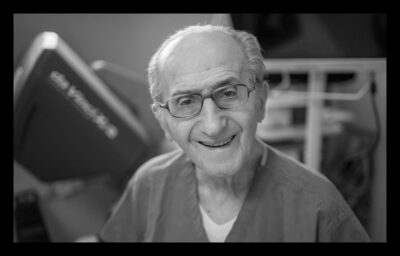The courses have been implemented on eight locations through the “Thematic Excellence program” with active collaboration of EKK, EMK, the 2nd Department of Pathology of Semmelweis University, NATUK and the ELTE Institute of Physics. Medical practitioners participating in the program could earn up to 4 or 8 educational credits upon completing the course.
The lectures gave an insight into various topics, such as the EKK and EMK’s research-development activities within the field of data-driven healthcare and the legal and cybersecurity aspects of introducing AI applications. The speakers of the event presented the latest results and findings in the two major areas within the field of public health: mammography and colonoscopy.
The event provided a great opportunity for participants to discuss the topics of the presentations with the lecturers.
Dr. Miklós Szócska (dean of the Faculty of Public Health, head of the Health Management Training Center) held a presentation about the importance of data, the concept of artificial intelligence (AI) and its role in public health.
“This postgraduate course series is particularly relevant, as we are currently on the way heading to a paradigm shift. Our purpose was to introduce the possible future use of artificial intelligence in healthcare. We also managed to outline how the different fields and disciplines of healthcare will be able to cooperate in the future. We also dispelled some of the myths, namely that AI can displace human labor and highlighted the fact, that AI may help in automatizing and making human knowledge more accessible. Another main objective of the pilot program was to improve the collaboration and sharing of data with others – added dr. Szócska.
Dr. Szócska also added that the technological assessment of artificial intelligence may take up to ten years, however with the help of AI we are already able to filter out false diagnoses at healthcare centers where AI is available to use. According to dr. Szócska, in respect of the patient safety aspect, artificial intelligence is ready to be implemented in healthcare.
“Upon the start of the project we shifted the focus on nationwide screening programs, as the doctors are working under huge pressure. It would help healthcare professionals tremendously if we could establish a prescreening system” – added dr. András Kiss. Dr. Kiss (head of the 2nd Department of Pathology) also highlighted the fact that the artificial intelligence project is aimed to improve the efficiency of pathological capacity. He also pointed out that artificial intelligence based systems won’t make a decision instead of a person, but they could help considerably improving the decision making process. AI systems could also adapt to all important areas. “One of the advantages of AI systems is that it doesn’t get tired and wear out easily and it can minimize the risk of making mistakes.”
Dr. Endre Kontsek (PhD student of the 2nd Department of Pathology) held a lecture about the decision support of artificial intelligence in colorectal cancer screening. With the help of a video footage, he illustrated the annotation process, where 16 pathologists performed scans of approximately 2300 sections within the period of a year. The data was later sent to data scientists, who used AI algorithms to process the obtained results. Artificial intelligence is able to perform assessment of these sections with the help of the provided data.
Adrián Pesti (student of the 2nd Department of Pathology) gave a presentation about digital pathology, dr. Tamás Palicz (strategic deputy director of EMK) held a presentation on artificial intelligence data protection and cybersecurity.
Alex Olar and István Márkusz, students from the ELTE TTK Institute of Physics talked about the application of artificial intelligence in healthcare from the perspective of machine learning.
“Artificial intelligence algorithms help us to assign images to different categories. This enables us to perform pre-screening” – added Alex Olar. He added that recently a number of clinics have already begun implementing digitalization in healthcare, as they recognized that digitalization may facilitate the process of diagnostics.
Dr. Krisztina Davidovics (expert of EMK) gave a talk on the legal aspects of the implementation of artificial intelligence. The pilot program (as it is a well-regulated environment) may become an ideal basis for further technological development from the legislative point of view. Dr. Davidovics mentioned that one of the major regulatory issues is the implementation of artificial intelligence based decision support tools in the daily working practice.
The courses are set to continue in spring 2022.
Dóra Horváth
Featured image (illustration) Gábor Ancsin
Translation: Norbert Lukács


